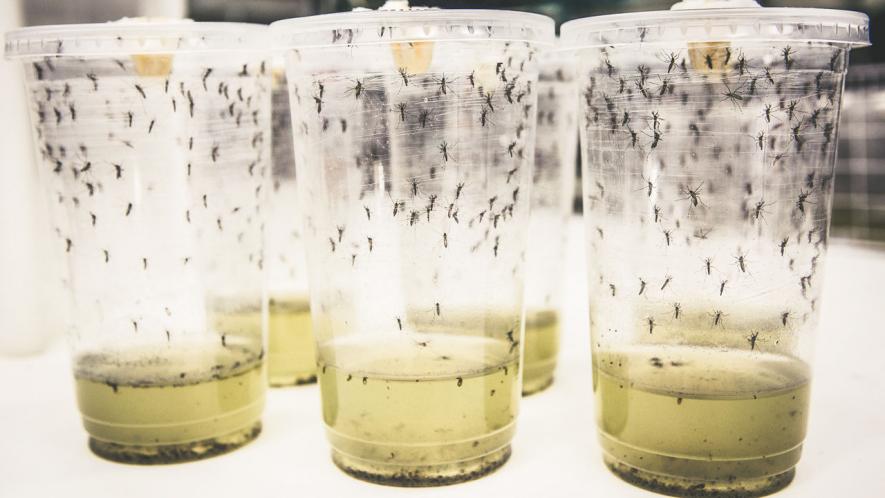Experiment on Mosquitoes in Indonesia Reduces Dengue by 77%

Image Courtesy: Science
Dengue fever, a rare disease 50 years ago, has become one of the great concerns of global public health nowadays. With the advent of monsoon, dengue outbreaks have become a yearly public health concern for India as well. The World Health Organisation (WHO) has put dengue fever among the top 10 threats to global health. An estimated 390 million people worldwide get infected by the virus that causes dengue per year, along with the death of about 25,000 people.
The Dengue virus spreads through mosquitoes, particularly belonging to the Aedes aegypti species. The disease is also known as ‘break-bone fever’ because of the severe pain it causes in muscles and bones.
A large-scale, randomised control trial conducted in Yogyakarta city of Indonesia, has brought some encouraging results as a way forward to deal with the disease. Indonesia has one of the highest rates of dengue in the world. The trial found a decrease in dengue by 77%, which involved manipulation of the mosquitoes that spread it, along with a decrease in dengue hospitalisation by 86%.
The results of the trial have been published in the NEJM (New England Journal of Medicine) recently. The three-year trial in Yogyakarta was initiated by the non-profit organisation World Mosquito Program (WMP).
The technique used in the trial was to infect the dengue-spreading mosquitoes with a bacterium known as Wolbachia. Back in 2009, a team of researchers at the University of Queensland, Brisbane, Australia, had proved that mosquitoes that are infected with the Wolbachia bacterium are safe from being infected by the dengue virus. Wolbachia spreads very fast and if small numbers of dengue virus-carrying mosquitoes are infected with it then most of these mosquitoes in a locality will be dengue-free within few months.
The WMP pioneered this technique and initially, they conducted such a trial study in Australia and the results were encouraging. Adi Utarini, a public health professor at Gadjah Mada University, Indonesia, was leading the WMP project in Yogyakarta. Prof. Utarini is also the lead author of the paper published in the NEJM, which says that Wolbachia readily spreads among the local mosquitoes and prevents dengue by as much as 77%.
Wolbachia does not harm the mosquito, but it tends to reside in the same part of the mosquito’s body where the dengue virus enters. The bacteria, in that space, compete for the resources and it becomes harder for the dengue virus to sustain its replication.
The trial was reported to have used about five million mosquito eggs that were infected with Wolbachia. These eggs were put in water buckets in the city every two weeks. It took nine months to give rise to a significant population of Wolbachia-infected mosquitoes.
The mosquitoes were released in half of the 24 zones that Yogyakarta was split into. The initial success of the techniques led the researchers to release the mosquitoes across the whole city and now the project is planning to move to surrounding areas.
Dr. Katie Anders, the director of the impact assessment of the WMP, was quoted to have said about the results as, “This result is ground-breaking. We think it can have an even greater impact when it is deployed at scale in large cities around the world, where dengue is a huge public health problem.”
Another positive aspect about Wolbachia is that it can pass on to the next generation of mosquitoes. The bacterium does so by altering the fertility of their hosts. It indicates that once a population of the dengue-causing mosquitoes is infected with Wolbachia, then the process can go on for a long time and continue protecting them against dengue fever.
Also read: New Dengue Vaccine Claims Success, But Apprehensions Remain
Get the latest reports & analysis with people's perspective on Protests, movements & deep analytical videos, discussions of the current affairs in your Telegram app. Subscribe to NewsClick's Telegram channel & get Real-Time updates on stories, as they get published on our website.
















